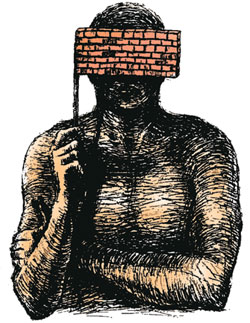 The word 'feudalism' is bandied about a lot. As a famous wit observed, everyone talks about the weather but no one does anything about it. Well it's about time Nepal took a long look at what's feudal and what isn't, and evolved a consensus on getting something done.
The word 'feudalism' is bandied about a lot. As a famous wit observed, everyone talks about the weather but no one does anything about it. Well it's about time Nepal took a long look at what's feudal and what isn't, and evolved a consensus on getting something done.
To be feudal is to have a vertical power structure, where birth and inheritance matter, and merit does not. There are no fresh opportunities in feudalism, just duties and burdens for the excluded, benefits for those born into privilege. Patronage is dispensed to a few in return for loyalty, and most people are left out.
Unaccountability and impunity are rampant. A feudal elite is accountable only to itself. Patrons own everything-or so they believe-and do not recognise their own thievery, corruption or misuse of public funds. There is a monopoly on the use of violence. Only feudalism's top people can arrest, torture, maim and kill. All others who do so are 'terrorists'.
This society remains mired in feudalism, despite its layers of apparent modernity. Beyond a few cutting edge business enterprises, and some arts and crafts, merit still means little here. Birth, access to power, and tradition are everything.
Feudals have governed this place since it became a nation. First the Shah family, then the Ranas, and latterly political parties that behave like royal courts, encouraging sycophancy, dynasties, and unaccountability. Instead of a single king, we had dozens, each with its own fawning coterie. Elections provided cover for misgovernance and gave the illusion of accountability. In the jungles, another form of feudalism grew in Maoist ranks, homage to a discredited historical outlook, impunity in the name of People's War.
Meanwhile, the royal palace fumed, plotted and manipulated, planting seeds of discord. Intrigue is, after all, what feudalism does best. A patron-in-chief supported by a network of troublemaking cronies stirred an already simmering pot.
Political parties were split and civil unrest was fanned. Diplomacy and government policy were second-guessed, even undermined. A discredited elite that lost much power in 1990 was hard at work to restore a hated status quo.
They succeeded in October of 2002, and cemented their position in 2005. Gyanendra's direct rule was the jewel in their crown. Again, the palace was at the centre of things, commanding the army directly and making executive decisions about press censorship and suppression of human rights.
For a time, Nepal was a theme park for tin pot feudalism. Military loyalties to 'king and country, in that order' were rewarded with even more medals and ribbons that bespoke nothing of substance. King and Crown Prince hurtled obliviously around a bemused, increasingly angry country. The world looked on, first with horror then with growing hope, as the Maoists made common ground with democrats, jumpstarting a long overdue people's movement for sanity.
Even the former king of Bhutan, whatever his other sins, ordered his own feudal elite to make way for democracy, musing in public that "you never know if you're going to get a bad king." At least a bad prime minister can be voted out, shamed in the press.
So with a new parliament in place, let the debate begin. Does feudalism belong in the 'New Nepal'? In palaces or political parties? If so, please justify. If not, what are we waiting for?



